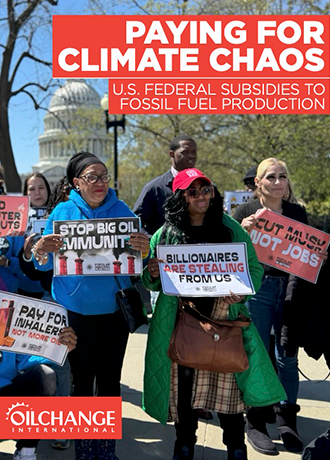
Paying for Climate Chaos: U.S. Federal Subsidies for Fossil Fuel Production
"Paying for Climate Chaos" reveals the staggering scope of federal government subsidies for fossil fuel production.
Oil Change International publishes upwards of 20 reports and briefings every year focused on supporting the movement for a just phase-out of fossil fuels.

"Paying for Climate Chaos" reveals the staggering scope of federal government subsidies for fossil fuel production.

This new analysis, an update to the data in our landmark Sky's Limit series, finds that the majority of the fossil fuel reserves within active fields and mines must now stay in the ground. Using updated 2023 data, the proportion of coal, oil, and gas reserves that must remain unextracted to meet the 1.5°C limit has increased from nearly 40% in 2018 to almost 60% in 2023.

G20 governments continue to provide billions of dollars for the production and consumption of fossil fuels. This report finds that they provide at least USD $63.9 billion per year in government support to the production and consumption of coal alone, with almost three-quarters of the support identified being directed to coal-fired power production.

The twin challenges of air pollution and climate change demand a rapid transition away from fossil fuels, and a particularly rapid phase-out of coal-fired power plants. Despite this, the Korean government continues to be among the biggest backers of coal-fired power plants around the world.

Risk guarantees and credit enhancement programs that subsidize coal-fired power plants could cost the Government of Indonesia and Indonesian ratepayers as much as tens of trillions of rupiah – many billions of U.S. dollars – over the coming decade.

An update to our previous reports on international coal finance, this report confirms that financing for coal threatens to undermine the Paris Agreement's aims.

In providing public finance for coal projects, Japan ranks as the worst offender among the G7 nations for supporting more than $22 billion in overseas coal projects from 2007-2015, and for plans to finance another $10 billion in future coal projects. Other G7 nations also financed coal development between 2007-2015

G20 country governments are providing $444 billion a year in subsidies for the production of fossil fuels. These governments are propping up the production of oil, gas and coal, most of which can never be used if the world is to avoid dangerous climate change, and undermining national climate commitments.

OECD countries support coal-fired power plants abroad by providing preferential financing through institutions called Export Credit Agencies (ECAs). These coal-fired power plants have significant costs, in the form damages to the health of local populations from air pollution, and the cost of climate-change causing emissions. This report finds that support for coal-fired power plants from the ECAs of OECD countries is implicated in tens of billions of dollars in local health impacts and climate change pollution each year.

Combining all known public sources, and augmenting them with subscription industry databases, this report makes comprehensive information on public financing for coal easily accessible for the first time.